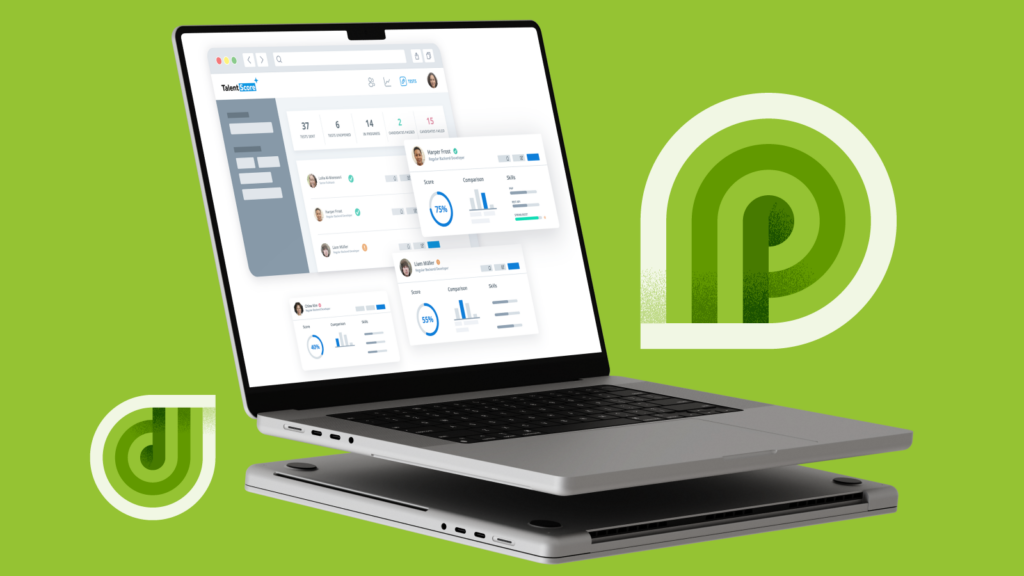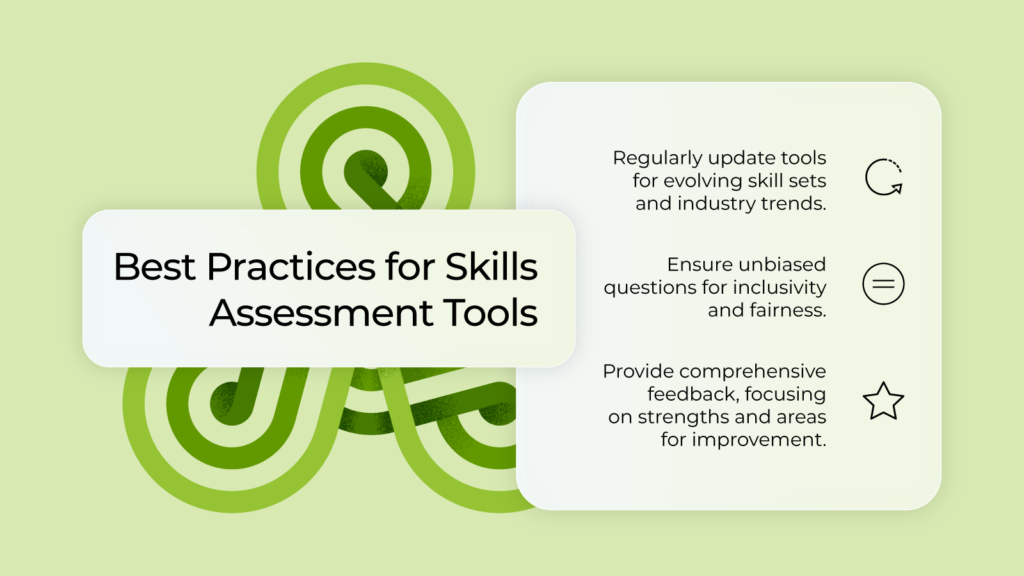The key to unlocking potential of skills assessment tools

You know that familiar feeling of trying to fit a square peg into a round hole? That’s precisely the sensation when you have a talented workforce, but they aren’t being placed in roles that best match their abilities.
This misalignment not only diminishes the potential of individuals but also hinders the overall productivity of an organization. So, the question that arises is, how do you accurately determine which employee is best suited for a particular role or project? Enter: skills assessment software.
These advanced skills assessment tools are designed to precisely evaluate and match the capabilities of employees to the requirements of specific roles. By leveraging the insights gained from such software, companies can maximize the efficiency, job performance, and potential of their teams. Let’s dive deeper into understanding how they work and the benefits they bring!
- What are skill assessment tools?
- The importance of skill evaluation
- Types of skill assessment tools
- Best practices for using assessment tools
- The future of skill assessment
- Benefits of using skills assessment tools
- Choosing the right tool for your needs
- Limitations and challenges
- Real-life examples of skill assessment implementation
- Conclusion
What are skill assessment tools?
Ever attempted to estimate the amount of sugar needed for a cake by just eyeballing it? You might end up with a dessert that’s either too sweet or too bland.
In the same way, trying to judge an individual’s abilities and talents without concrete data can lead to significant mismatches in the professional realm. This is where skills assessment tools come into play.

Much like a trusted set of measuring cups in baking, skills assessment tools serve as an invaluable instrument in the corporate kitchen. They meticulously evaluate and measure an individual’s competencies, ensuring that there’s a precise match between a role’s requirements and an employee’s capabilities.
With these tools in hand, businesses can confidently place the right person in the right position, maximizing both individual potential and organizational productivity.
The importance of skill evaluation
The importance of skill assessment cannot be overstated. Let’s explore why.
Bridging the skills gap
Have you ever immersed yourself in a puzzle game, meticulously trying to piece it together? There’s always that one piece that seems like it should fit, but after many attempts, you realize it just doesn’t belong in that particular spot.
This scenario mirrors the challenges faced by companies in identifying the skills gap within their workforce. Just like the ill-fitting puzzle piece, there might be employees who are nearly right for a role, but something crucial is missing.
Skill assessments act as a magnifying glass in this context. They meticulously evaluate each individual’s strengths and weaknesses, shedding light on areas that need improvement.
Armed with this knowledge, businesses can then make informed decisions, whether it’s providing targeted training to bridge the gap or hiring new talent that perfectly fits the missing space in their organizational jigsaw puzzle.
Enhancing productivity and efficiency
Imagine the rigorous preparation involved in training for a marathon. A runner doesn’t simply run endless miles every day; they assess their stamina, speed, and areas of weakness to focus on targeted training. It’s this understanding of strengths and vulnerabilities that paves the way for optimized performance.
Now, translate this scenario to a corporate environment. Just as a marathoner benefits from pinpointing specific areas for improvement, so do companies when they have a clear understanding of their employees’ skills. This is where assessment software becomes indispensable. By leveraging state-of-the-art assessment software, businesses can gain in-depth insights into the competencies of their workforce.
With this data, they can then design tailor-made training programs, ensuring that each employee receives the right kind of coaching. The result? Enhanced productivity, efficiency, and a team that’s poised to meet any challenge head-on.
Types of skill assessment tools
There’s no one-size-fits-all here. Different tools cater to various needs.
Technical Assessments
Just as a budding musician meticulously practices scales to hone their craft, a programmer delves deep into the intricacies of coding languages to perfect their skills. For the musician, knowing the scales is foundational; it’s the basis upon which melodies, harmonies, and entire compositions are built.
Similarly, for a programmer, mastery over code isn’t just about writing lines on a screen, but about crafting digital symphonies that power applications, websites, and systems. It’s this expertise that separates novices from maestros in both fields.
That’s where technical assessments come into the picture. They serve as a measure of an individual’s proficiency, much like a musical audition might gauge a performer’s aptitude.
Technical assessments scrutinize an individual’s ability to handle specific job-related tasks, ensuring that the person possesses the requisite knowledge and skill set.
Through these online assessments, employers can confidently identify top talent, ensuring that the individuals they bring on board are not only familiar with the basics but are truly adept at their craft.

Soft skills evaluation
Have you ever encountered someone who’s undeniably brilliant in their field, yet their interactions leave much to be desired? Perhaps they’re a touch abrasive, overly direct, or simply don’t gel well with the team. In the professional world, technical expertise is undoubtedly vital, but the importance of soft skills cannot be overstated.
These encompass qualities like effective communication, empathy, teamwork, and adaptability. While hard skills might get tasks done, it’s the soft skills that ensure tasks are accomplished harmoniously and collaboratively.
This is where soft skills evaluations come into play. By measuring interpersonal skills, communication abilities, emotional intelligence, and other crucial traits, these assessments offer insights beyond mere technical prowess. They shed light on how an individual might fit within a team, manage conflicts, or lead projects.
By prioritizing soft skills evaluations, businesses can cultivate a harmonious workplace where individuals not only excel in their roles but also contribute positively to the overall work environment and culture.
Cognitive abilities testing
Remember those mind-bending logic puzzles that would have you scratching your head for hours? Those puzzles, as tricky and fun as they were, do more than just entertain.
They engage our cognitive faculties, challenging us to think critically, draw conclusions, and employ logical reasoning. Similarly, in the professional realm, cognitive tests serve a pivotal role.
These aren’t mere puzzles designed for amusement; they’re tools carefully constructed to evaluate an individual’s problem-solving abilities, logical reasoning, analytical skills, and more.
Just as a logic puzzle might reveal how one approaches a complex problem, cognitive tests offer insights into how a potential employee might tackle real-world challenges, come up with innovative solutions, and make decisions under pressure.
By implementing these assessments, employers can gain a deeper understanding of a candidate’s cognitive strengths and weaknesses, ensuring they select individuals equipped not only with the right knowledge but also with the mental agility and acuity to thrive in their roles.
Best practices for using assessment tools
Think about the frustration and inefficiency of using a hammer when what you really need is a screwdriver.
You might get the job done, but it would be far from optimal and might even cause damage.
In a similar vein, simply having skills assessment tools in an organization’s arsenal isn’t enough; understanding how to utilize them effectively is paramount. Just as every tool in a toolbox has its specific use, skills assessment tools should be employed with precision and purpose.

Best practices include regularly updating the tool to keep abreast with evolving skill sets and industry trends, ensuring questions remain unbiased to foster inclusivity and fairness, and providing detailed feedback to candidates.
This feedback isn’t merely about indicating right or wrong answers, but about giving comprehensive insights into areas of strength and those requiring improvement.
By adhering to these best practices, organizations can harness the full potential of skills assessment tools, ensuring they accurately identify, nurture, and place talent in roles where they can truly shine.
The future of skill assessment
Picture this: a world where cutting-edge AI-driven tools don’t just assess your current abilities but also extrapolate and forecast the skills you might develop in the future.
It might sound like a page out of a science fiction novel, but with the rapid advancements in technology, it’s a reality that’s edging closer every day. Instead of merely evaluating where you stand now, these tools could provide insights into your potential growth trajectory, identifying paths and opportunities that align with your latent talents and future capabilities.
This futuristic vision signifies the convergence of technology and skill assessment, a blend of artificial intelligence’s predictive prowess with the nuanced understanding of human potential. As we stand on the cusp of this exciting frontier, one can only wonder at the vast possibilities it holds.
Will it redefine talent management? Could it revolutionize personal growth and career development? While the specifics remain to be seen, one thing is certain: the fusion of technology and skill assessment software promises a horizon brimming with potential and innovation.
Benefits of using skills assessment tools
In the intricate dance of recruitment and talent management, precision is paramount. Enter the skills assessment tool, an invaluable asset in the hiring process.
At its core, this tool doesn’t just streamline the recruitment procedure; it revolutionizes it. One of its most immediate advantages is cost-efficiency. By accurately gauging the abilities of candidates, businesses can drastically reduce the costs associated with bad hires, prolonged training periods, and high turnover rates.
But the benefits don’t stop there. The skills assessment tool ensures that the right candidate—someone whose skills align perfectly with the job’s requirements—gets the position. This not only optimizes team productivity but also fosters job satisfaction among employees, as they find themselves in roles that resonate with their expertise and passion.
In a competitive marketplace where every hire can significantly impact an organization’s trajectory, the numerous benefits offered by a skills assessment tool make it an indispensable instrument in the toolkit of modern businesses.
Choosing the right tool for your needs
Consider the decision of selecting a vehicle. If you’re a thrill-seeker looking for speed and performance, a sleek sports car might be your pick. However, if you have a large family and need space for soccer practices and grocery runs, a minivan would be the obvious choice.
It’s not about which vehicle is better universally, but rather which one suits your unique needs and lifestyle. The same logic applies when choosing tools and resources for an organization. It’s not just about grabbing the most popular or technologically advanced tool on the market; it’s about understanding what your organization specifically requires.

Before making a selection, it’s imperative to clearly define your company’s goals, challenges, and long-term vision. Do you need a tool that scales quickly for rapid growth, or is stability and long-term reliability more crucial?
By having a clear understanding of where your organization stands and where it aims to go, you can ensure that every tool and resource you invest in is perfectly aligned with your mission, propelling you towards success with precision and purpose.
Limitations and challenges
Every tool, no matter how advanced or well-regarded, comes with its set of limitations. This universal truth holds in the realm of technology, academia, industry, and beyond.
For instance, even the most sophisticated systems might inadvertently harbor biases, whether due to the data they were trained on or the inherent inclinations of their designers. Such biases, if unchecked, can skew results and lead to less than optimal decisions.
Furthermore, the dynamic landscape of skills and competencies presents another challenge. As industries evolve and technologies advance, the skills deemed essential today might become obsolete tomorrow.
Relying too heavily on a static tool without adapting to these changes can leave organizations trailing behind in the competitive race. It’s for these reasons that a conscious awareness of a tool’s limitations is crucial.
By understanding and acknowledging these constraints, users can employ tools more judiciously, complementing them with human judgment and continuous updates. This balanced approach ensures that while tools provide valuable insights and efficiency, their potential pitfalls are kept in check, leading to more informed and robust outcomes.
Real-life examples of skill assessment implementation
Remember that breakout company that seemingly came out of nowhere and skyrocketed to success last year? Behind the scenes, it’s likely they had more than just a unique product or service driving their ascent.
A critical aspect of any successful venture is the team powering it. To build such a formidable team, companies are increasingly recognizing the importance of both technical skill and holistic skill assessment.
While having the technical expertise is undeniably essential, understanding how to evaluate those skills effectively is equally crucial.
By employing comprehensive skill assessment methods, companies can identify not just technical prowess but also other vital attributes, like problem-solving abilities, adaptability, and teamwork. It’s this holistic approach to hiring and team-building that separates industry leaders from the rest.
So, when you see companies making waves in their respective sectors, it’s a good bet they’ve mastered the art and science of using skill assessment tests, ensuring every team member is not only technically adept but also a perfect fit for the company’s culture and vision.
Conclusion
So, ready to find the perfect fit for your company? Skill assessment tool, when used correctly, can be the compass guiding you to success. Remember, it’s not about just having the pieces, but making sure they fit perfectly.
Discover how DevSkiller’s skill assessment tool can help you.
Schedule a demo with one of our product experts or watch this quick 5-min demo video to find out more.
Share post